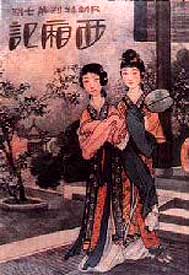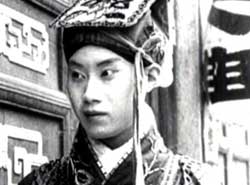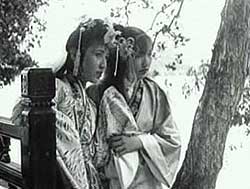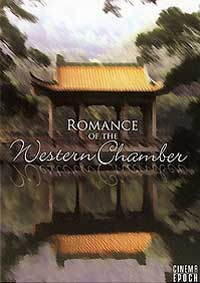 Chang Kung, a young artist & scholar, has traveled to visit a temple, where he falls in love at first sight with a young woman of the nobility, Cui Ying Ying, who had arrived at the same temple with her maid Hong Niang, to pray for her father.
Chang Kung, a young artist & scholar, has traveled to visit a temple, where he falls in love at first sight with a young woman of the nobility, Cui Ying Ying, who had arrived at the same temple with her maid Hong Niang, to pray for her father.
So begins the silent film adaptation of a 13th Century classic drama by Wang Shifu, Romance of the Western Chamber (Xixiang-ji, 1927), restored from the only print known to survive, discovered in France.
This is a beautiful film for action as well as for its love story. When a warrior monk fights his way through a bandit horde, it is suddenly obvious that films of swordplay & violence were well done very early in the history of films.
Far too few films survive from this era, & fewer still on dvd, so this one must be taken as representative of a lost or inaccessible body of films that established the nature of cinematic martial action.
 Sung Fei Hu, a feared bandit king, has designs upon Ying Ying. Whoever can overcome the bandits is promised the reward of Ying Ying as his bride. Sung Fei Hu, a feared bandit king, has designs upon Ying Ying. Whoever can overcome the bandits is promised the reward of Ying Ying as his bride.
Chang Kung is no warrior, but the prize inspires him in the struggle against banditry.
It comes down to three days awaiting for the bandit king to receive Ying Ying as his tribute, or for a general's forces to change the fate of the bandit-ruled countryside.
The huge battle scene that results comes eventually to a face-to-face duel between the general & the bandit confronting one another in full armor.
 For reasons not entirely explicated in the film, Chang Kung gets a lot of the credit for the successful campaign, & expected to receive Ying Ying's hand in marriage. But Ying Ying's mother Madam Cui doesn't believe he can support a wife. For reasons not entirely explicated in the film, Chang Kung gets a lot of the credit for the successful campaign, & expected to receive Ying Ying's hand in marriage. But Ying Ying's mother Madam Cui doesn't believe he can support a wife.
A curious dream sequence follows in which the artist Chang Kung is threatened by the bandit king who kidnaps Ying Ying.
Chang Kung arms himself with a giant writing brush dipped in ink & rides on it, like a witch's broom, to save the girl he loves.
But in the real world, before ever he can claim Ying Ying's hand, he must first pass the Imperial Exam, as otherwise a scholar could never hope to support a wife. He sets off for the capital, with certain success before him.
The restored print for this fine film has a new score by Toshiyumi Hiraoka that is very fitting & beautiful, though occasionally reminiscent of Pachelbel.
copyright © by Paghat the Ratgirl
|

